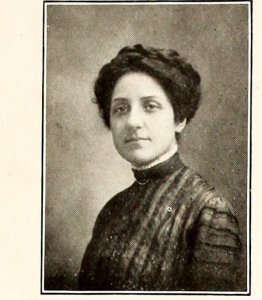 Agnes Harris may not have known it at the time, but when she taught tomato canning classes – and eventually tomato clubs in public schools — they would evolve into home economics classes and a UF/IFAS Extension program.
Agnes Harris may not have known it at the time, but when she taught tomato canning classes – and eventually tomato clubs in public schools — they would evolve into home economics classes and a UF/IFAS Extension program.
The same could be said for Harris’ corn clubs. They morphed into what we now know as Florida 4-H programs.
Here’s how it all started.
More than a century ago, Harris worked as head of the department of home economics at Florida State College for Women, now Florida State University. In 1908, Harris began teaching courses in people’s homes, showing women how to promote the health and economic benefits of canning fruits and vegetables.
At the time, home canning was a fairly new practice, and it let rural families extend the shelf life and nutritional value of their harvests. It also gave them a greater stake in marketing and distributing their produce.
In 1912, Harris left the Florida State College for Women to become the first home demonstration agent for the state of Florida and began starting tomato clubs for girls in 11 counties in Florida. The idea was to provide seeds for a crop that was easy to grow and to teach young people how to plant, grow and sell for profit any tomatoes they could not eat.
Extension home demonstration continued to expand throughout the century. It finally led to the establishment of the department of extension home economics, which would eventually morph into what we know today as the UF/IFAS department of family, youth and community sciences.
Harris was born on July 17, 1883 in Cedartown, Georgia.
From 1903 to 1908, Harris taught home economics in Georgia, and during her summers, she took classes at Columbia University. She earned bachelor’s degree from Columbia in 1910 and in 1922, a master’s degree.
In 1919, Harris left Florida to become the director of the Home Economics program in Texas. After a year, she moved to Washington, D.C. and worked as a field agent for the U.S. Department of Agriculture.
After seven years in Washington, Harris accepted a position as dean of women at the University of Alabama in Tuscaloosa. She organized the home economics school and became a dual dean of women and the home economics department in 1929. In 1941, Harris was awarded an honorary doctorate from the University of Alabama. In 1945, she became solely responsible for the home economics department.
Harris died in Tuscaloosa, Alabama, in 1952, leaving a lasting legacy of canning, home economics and what you could argue was the beginning of Extension in Florida.
About this Series: The year 2020 commemorates the centennial year of the passage of the 19th Amendment, a crucial achievement in the women’s suffrage movement. This milestone reminds us of the collective spirit marshalled to enact this change. Throughout the year, UF/IFAS is highlighting female researchers, educators, staff members, students and innovators who embodied a similar trailblazing spirit during their engagement with the university. These trailblazers left an indelible mark on both the university and the state of Florida. The 19th Amendment states, "The right of citizens of the United States to vote shall not be denied or abridged by the United States or by any State on account of sex,” although some women were still denied the right to vote until the passage of the Civil Rights Act of the 1960s. We hope this series inspires others to ignite their own trailblazing spirit and effect change in our world.
 1
1
